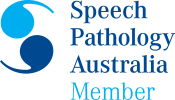Communication concerns
If you are visiting a speech pathologist for the first time because you are concerned that your child is not talking as much as their peers. Then, the first thing that will usually happen is your speech pathologist will make a case history. This involves going through your Child’s health and developmental history which may include birthing history, developmental milestones including speech, feeding and motor milestones, other health professionals involved in your child’s care, previous therapy or medical procedures and family and schooling history. This information is gathered to get a full picture of where your child is at developmentally in order to determine the most suitable assessment as well as determine any possible causes or impacting factors for a communication delay.
Once this has been completed, the speech pathologist will conduct a speech and language assessment. This may be done separately, with the speech component focusing on the child’s ability to produce each sound in words and conversation. This is often in the form or a flipbook with pictures used to elicit all of the sounds in the English language. The language component of the speech pathology assessment focuses on a child’s ability to understand as well as produce words, sentences and conversation. This often comes in the form of varying instructions with different concepts such as ‘tall’ vs ‘short’ or ‘before’ vs ‘after’ concepts, word and sentence generation activities as well as some elements of play and gesture for younger children.
Your speech pathologist may do this in the form of a formal assessment, which allows them to compare your child’s scores with standard measures taken from other children who are within the same age bracket as your child. Assessments can also be conducted informally, where the speech pathologist uses their expertise to determine whether your child is tracking, as they should be based on the milestones they have achieved. Both forms of assessment are valid and are often chosen based on what your child is able to sit through. For example, formal assessments tend to be quite lengthy and are better suited to a school age child who is able to sit for long periods at a tabletop. For a younger child, it may be more appropriate to assess informally in a play style interaction to best sustain their attention.
Once the assessment is complete, your speech pathologist will advise you on your child’s current speech and language development as well as whether they feel therapy is warranted.
Contact us for results focused on speech therapy
This article was written by our Speech Pathologist Ashleigh Fattah who is a Speech Pathology Australia
member. If you have questions about language activities, make an appointment. We‘ll provide you with
simple and effective therapy targeted to your concerns. Contact us today.
The post What is involved in an initial speech pathology consult appeared first on ENT Wellbeing Sydney.










